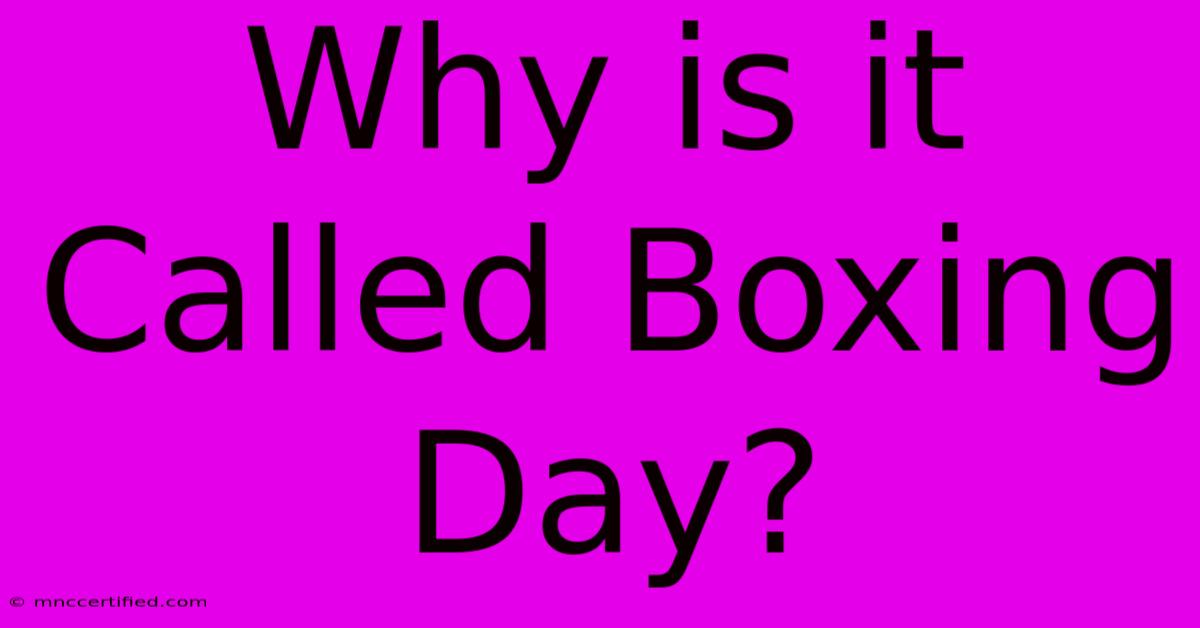Why Is It Called Boxing Day?

Table of Contents
Why is it Called Boxing Day? Unboxing the History of This Festive Holiday
Boxing Day, celebrated annually on December 26th, is a holiday observed in many countries across the Commonwealth. But why is it called Boxing Day? The origins are surprisingly complex, blending charitable giving, festive tipping, and even a bit of royal tradition. Let's delve into the history to uncover the truth behind this intriguing name.
The Leading Theories Behind the Name "Boxing Day"
Several theories attempt to explain the peculiar name "Boxing Day." While no single explanation is definitively conclusive, these are the most prominent and widely accepted:
1. Alms Boxes and Charitable Giving:
This is perhaps the most popular theory. During the Middle Ages, wealthy landowners and aristocrats would give their servants and the poor "Christmas boxes" filled with food, drink, and money on the day after Christmas. These boxes symbolized the act of giving and charity, a significant aspect of the Christmas season. The practice gradually evolved into a day of general gift-giving, extending beyond the master-servant relationship. This charitable aspect likely contributed significantly to the holiday's name.
2. The "Boxing Up" of Christmas Tips and Gifts:
A related theory focuses on the act of "boxing up" gifts and tips. Throughout the year, tradespeople, postmen, and other service providers would often receive small gifts or payments from their clients. These tips would be collected and "boxed up" to be distributed on Boxing Day. This explains the name as a practical reflection of the day's activities rather than purely charitable giving.
3. Royal Connections and the "Boxing Up" of Gifts:
Some historians suggest that the term originated within the royal household. The royal family would "box up" gifts to be distributed to the staff and lower levels of the royal court on the day after Christmas. This royal tradition may have influenced the practice amongst the wealthier classes, eventually becoming a more widespread custom.
The Evolution of Boxing Day: From Charity to a Public Holiday
Regardless of its precise origin, Boxing Day's significance evolved over time. What began as a day of charitable giving and servant rewards transformed into a broader public holiday. It became a day for family gatherings, sporting events, and more general gift-giving. In many countries, it's now considered a time for relaxation and socializing after the bustling Christmas celebrations.
Boxing Day Traditions Around the World:
While the core concept remains similar, Boxing Day traditions vary across different countries. In some, it's a day for hunting and other outdoor activities, while in others, it's characterized by special festive meals or community events. The specific traditions reflect the unique cultural nuances of each nation.
Understanding the Differences:
It's crucial to understand that the term "Boxing Day" doesn't always equate to the same holiday in every region. While its origins are largely shared, its significance and celebratory practices can vary considerably.
Key Takeaways: Understanding the Origins and Significance of Boxing Day
The exact origin of Boxing Day remains a matter of ongoing historical debate. However, the convergence of charitable giving, the "boxing up" of gifts and tips, and potential royal influence strongly suggests a multifaceted historical development. The holiday's evolution from a day of servant rewards to a widely celebrated public holiday underscores its lasting cultural impact. No matter the precise etymology, Boxing Day continues to hold a special place in the hearts and calendars of many across the globe.
Keywords: Boxing Day, history of Boxing Day, origins of Boxing Day, Boxing Day traditions, Christmas boxes, alms boxes, charitable giving, tips, gifts, royal tradition, Commonwealth, public holiday, festive holiday.

Thank you for visiting our website wich cover about Why Is It Called Boxing Day?. We hope the information provided has been useful to you. Feel free to contact us if you have any questions or need further assistance. See you next time and dont miss to bookmark.
Featured Posts
-
Wolves Vs Man Utd Live Stream
Dec 27, 2024
-
Seahawks Vs Bears Boxing Day Game Guide
Dec 27, 2024
-
J 20 Fighter Jet Chinas New Videos
Dec 27, 2024
-
Riley Jimmy Butler Is Untouchable
Dec 27, 2024
-
West Ham Vs Southampton Kick Off Tv Info
Dec 27, 2024